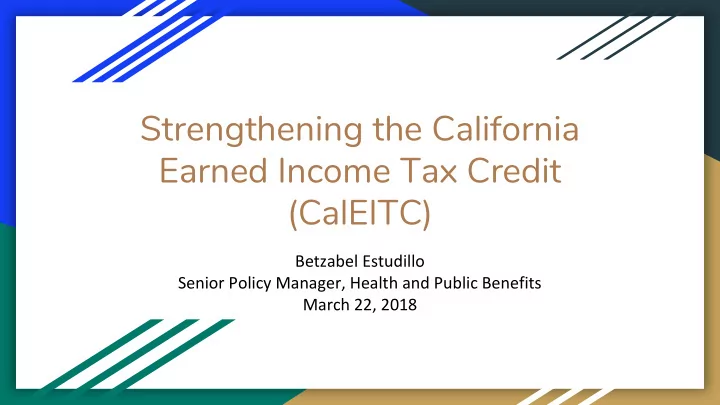

Strengthening the California Earned Income Tax Credit (CalEITC) Betzabel Estudillo Senior Policy Manager, Health and Public Benefits March 22, 2018
Who We Are: California Immigrant Policy Center Founded in 1996, CIPC is a non-partisan, non-profit statewide organization that seeks to inform public debate and policy decisions on issues affecting the state’s immigrants and their families in order to improve the quality of life for all Californians. CIPC engages in policy advocacy, and provides technical assistance, training and education on immigrant issues.
Background ● California has the highest poverty rate in the nation, with 1 out of 5 residents living in poverty. ● In addition, the federal government continues to attack low-income immigrants and communities of color, and threaten their access to vital social programs. ● The CalEITC excludes some of our most vulnerable communities from economic opportunities that could make the difference in putting food on the table, making rent, and providing for other life necessities. ● To expand opportunity and reduce poverty, the CalEITC must be inclusive of all residents, regardless of their immigration status or age.
What is the CalEITC? In 2015, California established the California ● Earned Income Tax Credit (CalEITC). The CalEITC provides low-income working families ● and individuals, particularly people in deep poverty, a modest financial tax credit which can help pay for transportation, food, school supplies, and other necessities. The CalEITC is modeled after the federal EITC. Unfortunately, some working families in California ● face serious economic challenges and yet are unable to access the CalEITC.
Strengthening the CalEITC Legislative and Budget Advocacy (2018-2019 budget) AB 2066 (Stone/Reyes) Co-sponsored by CIPC, Children’s Defense Fund and United Way CA ● AB 2066 strengthens the CalEITC by extending eligibility to three currently excluded ● populations: Young workers (ages 18-24) ○ Working seniors over 65 and without dependents ○ Immigrant tax filers who have an Individual Tax Identification Number (ITIN) or Social ○ Security Number (SSN) that was assigned to them by the federal government. A budget vehicle will run parallel to AB 2066 for a request to fund the removal of these exclusions and ensure robust outreach efforts and tax preparation assistance.
Access to CalEITC for Immigrant Tax Filers ● This proposal would provide a much needed economic support to 112,500-169,000 immigrant working families , depending on how many are prepared to file for the credit in 2019 ● While the federal EITC excludes ITIN tax filers and immigrants with a valid SSN whom have lost immigration relief, California is not bound by these rules for its state-funded tax credit. ● This proposal will help boost CalEITC outreach efforts, particularly in mixed-status households with U.S. citizen children who may not be able to benefit from CalEITC because of their parent’s immigration status. ● Including more immigrant families will also help reduce the harm of exclusionary federal actions, like a provision in the federal tax bill that denies the Child Tax Credit to roughly 1 million children in immigrant working families because they lack a SSN.
Strengthening the CalEITC Helps Reduce The Harm of Federal Tax Bill ● The recently enacted tax bill includes a provision that denies the CTC to children in immigrant working families because they lack a SSN (starting in tax year 2019). ● Key Data ○ 83% of all ITIN tax filers have children in their household. ○ 20% of ITIN filers in California who are eligible for the ACTC have at least 1 child with an ITIN who is eligible for that credit. Of these families, 40% would gain eligibility to the CalEITC if the credit is extended to ITIN filers. ○ If the CalEITC is extended to ITIN filers, this boost will replace 37% of the ACTC amount the ITIN filer (w/ at least 1 child w/ an ITIN) would lose. ○ The amount of ACTC lost by all CA ITIN filers = up to 66M ○ Extending CalEITC to ITIN filers would offset 20% of what is lost. Source: California Budget & Policy Center (2018)
CONTACT INFORMATION Betzabel Estudillo Senior Policy Manager, Health and Public Benefits California Immigrant Policy Center bestudillo@caimmigrant.org California Immigrant Policy Center Sacramento – Oakland – Los Angeles – San Diego www.CAimmigrant.org
Recommend
More recommend